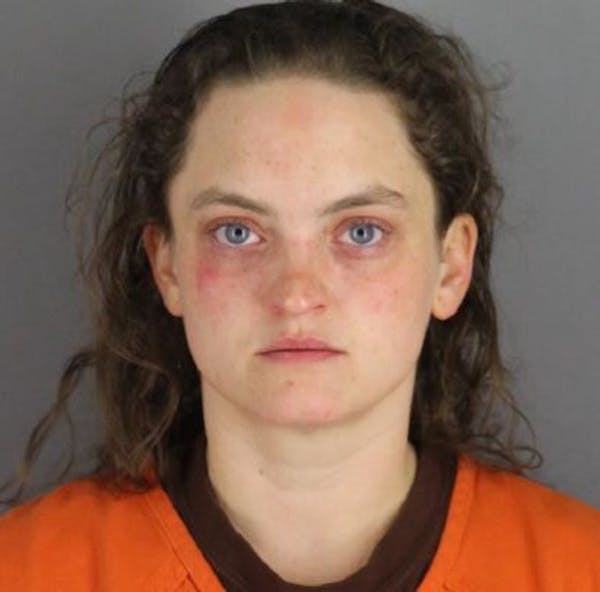A Maple Grove woman who claimed self-defense for fatally shooting her boyfriend won an appeal of her second-degree murder conviction after the Minnesota Court of Appeals ruled that an instruction to the jury was misstated.
Now, Stephanie Louise Clark could get a new trial.
Clark, 32, claimed to be in an abusive relationship with Don'Juan Butler, 30, who moved in with her and her then-5-year-old-son about 10 months before she killed Butler in March 2020. A Hennepin County jury deliberated four hours to find Clark, who had no criminal history, guilty in October 2021. She was sentenced to 25½ years in prison and remains in custody.
But a three-judge appeals panel unanimously ruled this week that when the deliberating jury asked for the legal definition of "imminent" — referring to the threat Clark was facing — the court misstated it as "immediate." The jury reached a guilty verdict shortly afterward.
The appeals ruling lays out that on March 5, 2020, Butler had abused and threatened Clark and had held a gun to her head, though not at the time she shot him.
Retired Judge Roger M. Klaphake, assigned to the case with judges Elise Larson and Peter Reyes, wrote that the term immediate "obliterates the nature of the buildup of terror and fear which had been systematically created over a long period of time."
"Given [Butler's] violent actions against Clark, the jury could have found that Clark was in imminent danger of great bodily harm, even if such danger was not immediate," the ruling said.
The panel said the definition telegraphed to jurors that Butler's actions did not qualify as an imminent threat and "placed a thumb on the scale for the prosecution."
Prosecutors in the Hennepin County Attorney's Office are considering whether to appeal to the Minnesota Supreme Court, but declined to comment further. If they decide against it, Clark's case would go back to the district court for a new trial.
Clark retained attorneys Caitlinrose Fisher and Matthew Forsgren for the appeal. Her trial lawyer, Eric Doolittle, objected to the jury instruction on imminent, but District Judge Peter Cahill allowed it.
"By narrowly defining it like that, I knew we were done," Doolittle said in a phone interview.
Klaphake said in the ruling that "the facts of the case are tragic ... especially in light of Butler's escalating and violent abuse against Clark."
Clark testified that she shot Butler because she feared he would kill her or hurt her son. The abuse became progressively worse and was occurring nearly every day. She said she couldn't leave home without his permission and that he yelled, pushed, kicked and slapped her and frequently paced around with loaded firearms. When he became angry, he would force Clark to kneel and he would hit her.
She testified that on the day of the shooting, Butler hit her and held a loaded gun to her head. She left to pick up her son, and when she returned he continued abusing her. He threatened her, saying: "Wait for tonight. Wait for [your son] to go to bed. I'm going to break your ribs," the appellate ruling states, quoting Clark's testimony.
She picked up a gun and shot Butler eight times. As he fled to the bedroom, she grabbed another loaded gun and shot him again five times.
At sentencing, Doolittle pleaded with Cahill for a lesser penalty because Clark was motivated by extreme terror "having a loaded gun put to her head multiple times, having to kneel and take beatings, the threats, the physical violence."
Doolittle said these cases are often behind closed doors with no witnesses. Of the 20 women killed in domestic violence in Minnesota in 2020, he said "it is reasonable to believe that they would be in similar circumstances to Ms. Clark."
Assistant Hennepin County Attorney Krista White said in her closing argument that, "We don't get to hear from Don'Juan Butler what happened that night." And she honed in on the second gun to reject Clark's self-defense claim.
"She had every opportunity to leave or to make different choices that night and instead she murdered him," White said.
Clark told Cahill at sentencing that she loved Butler and is haunted by what happened.
"I knew he was going to kill me ... All I could think about was not being able to protect my son. All I can really remember is feeling scared and pulling the trigger over and over."
Cahill told Clark that he didn't find her to be a credible witness and the only corroboration of domestic abuse "is a bruise." He sided with the state, saying it is more likely Clark was angry and snapped. And while Butler may have abused Clark, Cahill said "he was not the aggressor."
Minnesota has not defined imminent in the law of self-defense, so the panel looked to Kansas' definition that recognizes "the unique nature of domestic abuse as it related to a claim of self-defense."
Doolittle said victims are often killed, but when they kill their abusers in self-defense, victims are prosecuted.
"What I'm hoping out of this is people take a critical look at how we prosecute women who were battered women," he said.
Officials say man shot 2 months ago in vacant downtown Minneapolis triplex was victim of homicide

Official who helped MSHSL on pioneering ventures dies at 89

Buy Nothing meets GoFundMe: How a Eden Prairie website aims to 'revolutionize' philanthropy

